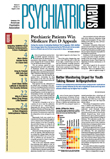The article in the March 3 issue on Oregon's Death With Dignity Act (DWDA) was relevant and enlightening. Shortly after the 6-3 Supreme Court vote supporting the law came the eighth annual report on the DWDA, a remarkable medical and psychosocial experiment. The report is posted at<www.oregon.gov/DHS/ph/pas/>.
Since 1998, 246 people have used prescribed medication to hasten death (average 31/year; 12 per 10,000 deaths in Oregon). A large study of terminally ill Oregonians (1,384 cases, 2004) found that 17 percent considered physician aid in dying (PAD) seriously enough to discuss it with family members; 2 percent formally requested it, and of those, 1 in 16 used it.
Patient requests for PAD stemmed from multiple concerns, primarily the loss of ability to participate in enjoyable activities, loss of dignity, and loss of autonomy.
During 2005, 36 of 38 PAD patients (95 percent) died at home. All had some form of health insurance. Over 90 percent of the patients were enrolled in hospice care, mostly home based (almost four times the national rate). End-of-life care in Oregon is exemplary for the rest of the country, thanks in part to DWDA.
There is preliminary evidence of a lower overall suicide rate among Oregon's terminally ill residents. Even most of those who enter the program die of natural causes. The PAD option is psychological insurance that brings peace of mind; over the years several dozen who enrolled and died peacefully had reported their intent to resort to violent suicide if they found life unbearable.
The term “assisted suicide” is inaccurate and misleading with respect to the DWDA. These patients and the typical suicide are opposites:
•
The suicidal patient has no terminal illness but wants to die; the DWDA patient has a terminal illness and wants to live.
•
Typical suicides bring shock and tragedy to families and friends; DWDA deaths are peaceful and supported by loved ones.
•
Typical suicides are secretive and often impulsive and violent. Death in DWDA is planned; it changes only timing in a minor way, but adds control in a major and socially approved way.
•
Suicide is an expression of despair and futility; DWDA is a form of affirmation and empowerment.
APA has not taken a position on DWDA. If it does, the above points should be taken into account. Religious objections to PAD should not interfere with those who believe DWDA is consistent with humane and ethical medical practice, the integrity of the doctor-patient relationship, the right of individuals to exercise choice in a free, pluralistic society, and the role of state law in regulating medical practice.
